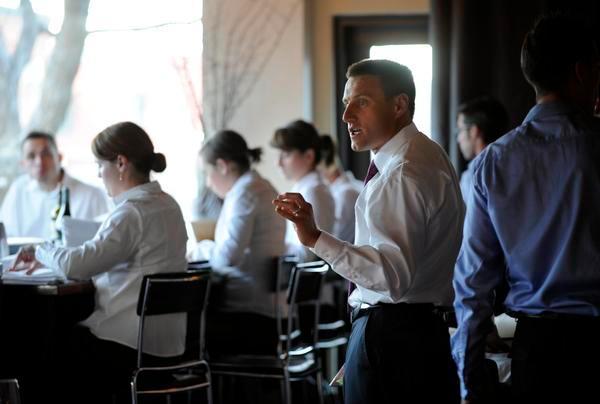In the restaurant industry, we’re taught to be like a swan. Under the water where no one can see, you paddle as hard as you can. Above the surface, you are graceful and composed. Guests should not be privy to the hardships or stressors we face.
Since reopening our four dining rooms in June, not a night goes by that a guest doesn’t ask me how I’m doing. Defaulting to swan mode, I tell them we’re doing fine, hanging in there, the same old same old. Do I really want to tell them how we’re doing while they’re enjoying a beautiful night on our patio?
We never tell our guests how small the margins are (industry standards are 6%). We never tell our guests how many hours we work, or how much we really should be charging them. They don’t want to know that.
A beautiful night on your favorite restaurant patio may lull you into thinking that everything is going to be ok, that this Instagrammable moment that transports you to a European state of mind is the new normal, but fall and winter are just around the corner, and our industry will not make it through the first month of snow. Not just in Colorado, but we will see this across the United States.
It’s time we are honest about the fate of the independent restaurant industry. The answer is, “No, we are not fine.”
No industry can endure being closed for three months only to reopen to 50% capacity. While I support Gov. Jared Polis’ decisions to keep our society safe, restaurants build their business around the age-old adage: “location, location, location.” There’s a reason why restaurants operate in the hearts of communities and line Main Streets everywhere, and we pay a premium for it. With the pandemic, the formula is broken and the cost no longer makes sense when our best days and nights are making, at best, half of the revenue we used to make. It will be even worse when patio season is over.
Even folks who do not dine out will feel the pain of the mass closure of restaurants because the U.S. food system relies on restaurants being open. In Colorado alone, we have 35,650 small farms, not to mention the tens of thousands of bakers, fishermen, butchers, wine producers, artisanal purveyors, florists, linen companies, drivers, delivery workers and more along the restaurant supply chain.
As a country, America is in the midst of an incredible year of reckoning: social, political, environmental and more. We are in it. And because we’re in it, I fear that it may be hard for us to consider the future. But if we take immediate action, we can cross off reckoning with the catastrophic fallout of restaurants, America’s largest private-sector employer, going out of business in the coming months.
We don’t have to be hamstrung by the trickle-down effect of this in January. We can prevent this now.
Our great senators and congresspeople don’t have a crystal ball to see the future of restaurants, but as an independent restaurateur and on behalf of every restaurant in America, I’m here to give them 20/20 vision to make a decision to fight for the future of restaurants.
An estimated 1 in 3 American restaurants will close by year-end without congressional support. That means millions of people will be out of work. That means problems in our food chain and food delivery system, from farmers and truck drivers to winemakers and dishwashers.
I know that Congress and the Senate worked very hard to pass the Paycheck Protection Program in the spring. Back then, everyone thought the pandemic would be done by Easter. The original PPP was an 8-week fix. We are now staring down an 18-month problem. Eighteen long months of 50% revenue in the best-case scenario. Without patios and summer nights, it’s exponentially lower.
The fallout of millions of American jobs lost due to the closure of independent restaurants is not a partisan problem. I’ve been inspired to see leaders like Sen. Roger Wicker, R-Miss., Rep. Earl Blumenauer, D-Ore., and Sen. Kyrsten Sinema, R-Ariz., acknowledge that saving the restaurant industry is a cause that supersedes partisan aisles. It’s time to push the RESTAURANTSs Act through.
If you are progressive and care about workers having jobs, support this bill. Not only are you supporting your favorite date-night spot or local greasy-spoon breakfast joint, but also you are supporting the heartbeat of every community. Restaurants are hubs for minority employment and advancement: 60% of all chefs are minorities while 53% of bussers, runners, baristas, prep cooks, dishwashers and kitchen porters are Black, Indigenous, and people of color. Restaurants employ more minority employee managers than any other industry and nearly half of all adults got their first job experience in a restaurant. More than 50% of all restaurant workers are women, and restaurants employ over one million single mothers. If those facts are not enough, consider that restaurants generate middle-class jobs at a rate three times faster than the economy.
If you are fiscally conservative, consider this a wartime lever to pull in the fight against COVID-19, an invisible enemy that has ravaged our country and its citizens’ lives. The RESTAURANTS Act is in defense of American small businesses, who are in dire need of an energy boost to continue staying in the fight.
To the congresspeople and senators who have yet to sign on to the RESTAURANTS Act, including our own state’s representatives Michael Bennet, Ken Buck, Doug Lamborn and Scott Tipton: this is not a partisan deal. I’m giving you 20/20 vision when I say Colorado will lose almost 9% of the state’s workforce without a fix. Finding a solution now will stave off dealing with the economic reckoning that is to come when independent restaurants close.
To the guests who ask how we are doing, I will no longer lie when you ask how we’re doing. There is nothing more that I want to say than that we are fine and healthy, but until we have the RESTAURANTS Act, the truth is, we will be on the verge of closing, or will be closed.
On behalf of the 500,000 independent restaurants and 11 million workers, I urge you to please visit www.saverestaurants.com or write to your elected officials to pass the RESTAURANTS Act.
Bobby Stuckey is the co-founder and master sommelier of Frasca Hospitality Group (Frasca Food and Wine, Tavernetta, Pizzeria Locale Boulder, Sunday Vinyl) and the founder of the Independent Restaurant Coalition.
To send a letter to the editor about this article, submit online or check out our guidelines for how to submit by email or mail.



















